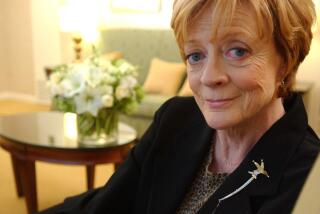Life at the ‘Abbey’ Cuts across class
- Share via
‘Downton Abbey” creator Julian Fellowes remembers doing that thing that Emmy nominees do when he attended last year’s ceremony at the Nokia Theatre. His British costume drama was up for 11 Emmys, but upon arriving in Los Angeles, Fellowes had been firmly told that the show didn’t have a chance of winning. Rival HBO miniseries “Mildred Pierce” was going to sweep the night.
“We all got our fake smiles on so you don’t have that big close-up of you sobbing on television,” Fellowes remembers. “You arrange your face in this kind of incredibly generous, benevolent grin in order to clap for the winner.”
But there were few fake smiles needed. “Downton” won six Emmys, including for miniseries, a writing award for Fellowes and a supporting actress trophy for the acerbic Maggie Smith. (In a shift, Season 2 will compete at the Emmys in the drama series category.)
Whether the awards provided momentum or if that particular locomotive had already left the station is unclear, but when the show returned to PBS’ “Masterpiece” for a second season in January, “Downton” had become a pop culture phenomenon transcending its public television niche.
“You know something’s going on when you become an adjective,” says Elizabeth McGovern, who plays the American-born Countess Cora. “I remember the first time reading something described as ‘very “Downton Abbey.” ’ When it becomes a point of reference outside the show itself, that’s when you know there’s some magic working.”
Just don’t ask McGovern about the source of that alchemy. “It’s all a big mystery to me,” she says, laughing, during a late-night phone call from her London home. “Downton” has often been compared to the 1970s BBC drama “Upstairs, Downstairs,” which, like “Downton,” equally divided its attention between the members of a wealthy family and their downstairs servants. But the similarities are largely confined to format and its similar early 20th century setting. “Downton” is bigger, brasher and bolder than its polite predecessor, quickly cutting among multiple stories in a manner designed to appeal to modern viewers’ shorter attention spans.
“With those old-period BBC dramas like ‘Brideshead’ and ‘Upstairs,’ you could go out and answer the door and come back and pick it up right away,” Fellowes says. “We’re much closer to American shows like ‘The West Wing’ and ‘NYPD Blue.’ Although everyone’s wearing period dress and saying reasonably period things and sticking to the morality of the time period, it’s a modern show in every other respect.”
That’s borne out in the show’s ratings, which included large swaths of young women -- and even men -- who hadn’t watched PBS since Elmo taught them the alphabet. Devoted fans hosted Sunday night viewing parties, complete with tea, British cheeses and drinking games. (Take a drink every time the Dowager Countess makes a cutting remark, a character overhears something important, O’Brien smokes or Thomas sneers.) Others took to social media sites to debate the show’s soapy plot twists. (When Mr. Bates’ cane -- not the valet himself, but his cane! -- has accounts on Twitter and Tumblr, things might be spiraling out of hand.)
Fellowes, battling a nasty bout with pneumonia, was recently putting the finishing touches on Season 3’s last episode. He says the coming season will find the show’s characters adjusting to life following the Great War, a period of “extraordinary social change” that will dramatically affect everyone at Downton. Oh, and Shirley MacLaine has joined the cast, playing Countess Cora’s visiting mother. Might we expect a throw-down or two between her and Smith’s Dowager Countess?
“Oh, I promise you there will be fireworks,” McGovern says. “Beyond that I say nothing.”
In some respects, though, it will be difficult for “Downton Abbey” to become any bigger than it already is. Joanne Froggatt, who portrays head housemaid Anna, wife of the now-imprisoned Mr. Bates (do you have your Free Bates T-shirt yet?), recalls an email exchange she had with the vicar who will be officiating her wedding later this year.
“After asking about the arrangements, he wrote, ‘Oh, if you could arrange for my wife and I to visit the set of “Downton,” I’ll make sure you go straight to heaven,’ ” Froggatt says. “I thought, ‘Well, if that’s the stamp of approval, I’ll work that out and make sure it happens.’ ”



